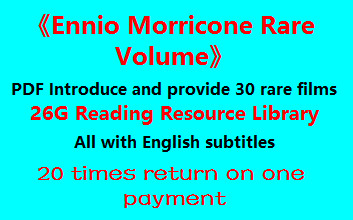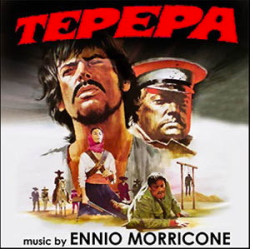TEPEPA (1968)
Tepepa is an Italian-produced epic Western, set during the Mexican Revolution, directed by Giulio Petroni. It tells the story of the eponymous revolutionary Jesus Maria ‘Tepepa’ Moran (Tomas Milian), who is due to be executed by the corrupt police chief Cascorro (played, incredibly, by Orson Welles). Tepepa is unexpectedly saved by Price (John Steiner), an English doctor, but before long it becomes clear that Price only saved him so that he could kill him himself, as he believes Tepepa was responsible for the death of his fiancée. Added into this mix of death and retribution is a political undertone involving the revolution, and the plight of local landowners, and the unscrupulous businessmen who are attempting to exploit them.
The main theme, “Viva La Revolucion,” is a wonderful piece of traditional Mexicana, but is actually quite conventional compared to some of the other western themes in the Morricone canon. It builds from a slow, pastoral, almost lullabyish melody for woodwinds and guitars, but becomes increasingly grand and expansive as it develops, making excellent use of larger orchestral forces and a more prominent piano as it grows. The theme for “Tepepa e Price” comments on the initially positive and fraternal relationship between the pair with a pretty, intimate flute melody, but also has a slight sense of uncertainty underneath it from the banks of accompanying guitars, which cleverly alerts listeners to Price’s duplicity before the movie does. Incredibly, the guitar part of this theme reminds me very much of the one in “Ancora Qui,’ the original song that Morricone wrote for Quentin Tarantino’s Django Unchained in 2012 – 44 years later!
As the score develops several other pieces stand out for their extensive use of Spanish guitars. Both “Tradimento Primo” and “A Meta Strada” have a wonderful nostalgic air, guitars backed with quiet orchestrations for warm strings that help convey Tepepa’s quiet resilience and deep affection for his nation. This continues on into “Al Messico Che Vorrei,” is a folk song performed by Maria Cristina Brancucci, which layers her vocals against a bright, quintessential Morricone trumpet solo. “Consegna Delle Armi” and “Una Povera Casa” are suspense cues for tight, nervous orchestrations, which convey the urgency and determination of Tepepa as he continues to fight for justice. The rest of the album comprises a series of extended variations on these core thematic ideas, as is often the case with Morricone scores of this type.
I like the score for Tepepa a lot; it doesn’t have the anarchic or bizarre qualities of some of Morricone’s other western scores from the period, and is instead a much more respectful and straightforward work that pays homage to this enduring Mexican folk hero. The excellent main theme is usually included on Morricone Western soundtrack compilations, while the score itself has been released numerous times on vinyl LP and CD over the years, often paired with another score, usually either La Resa dei Conti or Vamos a Matar Compañeros. This release reviewed here is the limited edition from GDM/Legend that came out in 2012.
Track Listing: 1. Viva la Revolucion (4:18), 2. Tepepa e Price (0:55), 3. Tradimento Primo (2:15), 4. A Metà Strada (1:51), 5. Al Messico Che Vorrei (4:50), 6. Una Rosa (1:44), 7. Consegna Delle Armi (1:17), 8. Una Povera Casa (1:02), 9. Tradimento Secondo (2:52), 10. Viva la Revolucion (5:29), 11. Tepepa e Price #2 (0:44), 12. Tradimento Primo #2 (1:11), 13. Viva la Revolucion #2 (2:29), 14. Tepepa (Marcetta) (1:58), 15. Viva la Revolucion #3 (3:09), 16. Tepepa (Tema d’Amore) (2:21), 17. Ondas de Amor – Serenade (3:06), 18. Una Rosa #2 (1:31), 19. Viva la Revolucion #4 (5:37), 20. A Metà Strada #2 (1:37), 21. Tepepa (Fragrante Melodia) (1:26), 22. Viva la Revolucion #5 (1:27), 23. Tradimento Primo #3 (3:43), 24. Viva la Revolucion #6 (3:13), 25. Una Rosa #3 (1:24), 26. Tepepa (Banda) (1:54), 27. Viva la Revolucion #7 (3:14), 28. Al Messico Che Vorrei (Karaoke Version) (4:43). GDM/Legend 4220DLX, 71 minutes 20 seconds.












